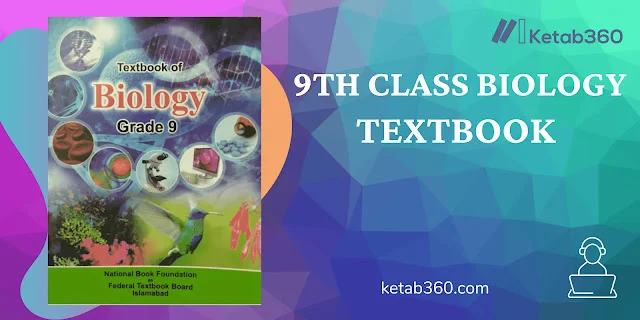9th Class Biology Book By Federal Board
Get the latest 9th Class Biology book in English from National Book Foundation as Federal Textbook Board Islamabad. You can find the book for cities like Lahore and Faisalabad, or download the PDF version for English Medium. Secure your copy of the 9th Class Biology book in PDF format today.
What is inside the Book:
The 9th Class Biology book is a key resource for students interested in life sciences. If you love learning about the details of living things, this book is perfect for you.
The book covers everything from the basics of life to complex life systems. With 10 chapters, it gives a complete overview of important topics in biology.
It also includes extra resources and reference links for students who want to explore topics more deeply. This makes the book not just informative but also a great tool for further learning.
Chapter # 1: The Science Of Biology
This is the field that schools us about how plants, creatures and even microscopic organisms work, develop and connect with one another. It is by studying this subject that we try to comprehend the fundamental units of life i.e., cells and how they all combine together in order to form organisms. We can simply take BIO with learning the different wonderful things from Nature, to Human body or nifty Gritty of Environment. The revelation about just how interconnected the world is, with everything relying so heavily on everything else to function and prosper?
Chapter # 2: Biodiversity
For those who need a refresh, biodiversity refers to all of the different plant and animal species living in an area. Having different forms of life around is essential to the continued health and balance of nature, which means we want clean air and water. For instance, rain forests are teeming with a wide range of animals and plants where each of them works together to maintain the health of their surrounding environment. Biodiversity conservation is essential in securing the safe and healthy planet for all creatures.
Chapter # 3: Cell
A cell is the elementary and smallest live particle. Cells are to plants, animals and people just like a brick is part of the basic foundation. A Cell is made up of many parts that exist and help the cell perform its function, such as the Nucleic which guides each organelle by telling it how to react or do an action within in a certain time period and also you have a membrane (‘gate’) which works like our skin allowing proteins etc.. access give out when they might be harmful. They were all cells to become the working units of life, cooperating together for living things to grow and prosper. The study of cells has allowed scientist and medical Inc to learn more about life and how we can keep our individual self healthy.
Chapter # 4: Cell Cycle
The cell cycle is a process that every cell in our body goes through to grow and divide. Think of it like a school year where the cell starts as a young student, grows, and then makes a copy of itself. The cell cycle has different stages: the cell grows, makes copies of its parts, and then splits into two new cells. Understanding the cell cycle helps us learn how living things work and stay healthy.
Chapter # 5: Tissue, Organ and Organ Systems
Tissues are groups of similar cells that work together to do a specific job in the body. When different tissues join together, they form an organ, like the heart or lungs, which does an important job to keep us healthy. Many organs work together to make an organ system, like the digestive system, which helps us eat and use food for energy. Understanding tissues, organs, and organ systems is key to knowing how our bodies function. These terms are important in biology and health science.
Chapter # 6: Molecular Biology
Molecular Biology is the study of tiny parts inside our cells that help our bodies work. It looks at how DNA, the special code in our cells, makes us who we are and how it helps our bodies grow and stay healthy. Molecular Biology helps scientists understand how cells talk to each other and how they do their jobs. This science is super important for finding new ways to treat illnesses and improve health.
Chapter # 7: Metabolism
Metabolism is like your body’s energy factory. It’s a series of steps that change the food you eat into the energy you need to play, learn, and grow. This process helps keep you healthy by turning nutrients from your food into the fuel your body needs to work properly. So, when you eat a meal, your metabolism gets to work, turning that food into energy, which helps you stay active and strong.
Chapter # 8: Plant Physiology
Plant Physiology is the study of how plants work and stay healthy. It covers how plants grow, get their food from the sun, and use water to stay alive. By understanding plant physiology, we learn how plants make food through photosynthesis, how they move water and nutrients, and how they react to their environment. This knowledge helps us grow stronger plants and take better care of our green friends.
Chapter # 9: Plant Reproduction
Plant reproduction is how plants make new plants. There are two main ways they do this: through seeds and by making copies of themselves. In seed reproduction, plants produce seeds that grow into new plants. In asexual reproduction, plants create new plants from parts of themselves, like stems or leaves. This helps them spread and grow in different places. Learning about plant reproduction is important because it helps us understand how plants grow, make food, and help our environment.
Chapter # 10: Evolution
Evolution is how living things change and develop over time. This means that plants, animals, and even tiny creatures can gradually become different from their ancestors. For example, dinosaurs evolved into birds, and humans evolved from early primates. This change happens very slowly, often over millions of years. Scientists study evolution to understand how life on Earth has developed and adapted. Key terms related to evolution include “natural selection,” “species,” and “adaptation.”






